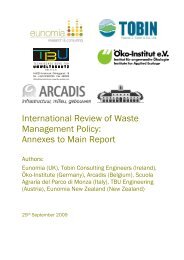Report of the Local Government Efficiency Review Group
Report of the Local Government Efficiency Review Group
Report of the Local Government Efficiency Review Group
Create successful ePaper yourself
Turn your PDF publications into a flip-book with our unique Google optimized e-Paper software.
educe <strong>the</strong> number <strong>of</strong> such transactions and <strong>the</strong> associated costs by up to<br />
25%, once <strong>the</strong> upfront costs associated with a move to e-planning have<br />
been met (including s<strong>of</strong>tware, licensing and hardware costs. A 25% cost<br />
saving, based on <strong>the</strong> 2010 estimates for local authority development<br />
management costs, would suggest a cost saving <strong>of</strong> <strong>the</strong> order <strong>of</strong> €15 million<br />
per annum, once <strong>the</strong> majority <strong>of</strong> planning applications are received and<br />
processed by means <strong>of</strong> e-planning processes. This figure is based on a<br />
2010 budgeted expenditure <strong>of</strong> €105.9 million nationally for development<br />
management, <strong>of</strong> which some €70 million is estimated to be made up <strong>of</strong><br />
staffing costs.<br />
10.4.18 There are also potential efficiencies to be gained in examining <strong>the</strong> time<br />
taken to process planning applications, <strong>the</strong> various steps involved in <strong>the</strong><br />
process, and <strong>the</strong> scope for streamlining.<br />
10.4.19 The <strong>Group</strong> recommends that <strong>the</strong> planning fee levels set by <strong>the</strong> Department<br />
<strong>of</strong> <strong>the</strong> Environment, Heritage and <strong>Local</strong> <strong>Government</strong> should be revised to<br />
allow for a greater recovery <strong>of</strong> administrative costs for different types and<br />
scales <strong>of</strong> planning applications. An initial increase, to allow 50% cost<br />
recovery, should be introduced at this stage. The increase in fees should<br />
be linked to an accelerated roll-out <strong>of</strong> e-planning in local authorities, with <strong>the</strong><br />
aim <strong>of</strong> reducing transaction costs for both <strong>the</strong> local authorities and<br />
customers. A fur<strong>the</strong>r move to greater cost recovery (to say 75%) could be<br />
facilitated within 3 years but only as a quid pro quo for <strong>the</strong> introduction <strong>of</strong><br />
ePlanning and <strong>the</strong> provision <strong>of</strong> greater efficiencies and removal <strong>of</strong> costs<br />
from <strong>the</strong> development management system. A move to full cost recovery<br />
over a 5 year period should also be envisaged.<br />
10.4.20 The cost <strong>of</strong> introducing ePlanning would be met from increased fees; <strong>the</strong><br />
cost <strong>of</strong> implementing to ePlanning on national basis is estimated at €5<br />
million.<br />
10.4.21 The Department had identified a range <strong>of</strong> proposed improvements to <strong>the</strong><br />
planning system at local level arising from a fees increase. These include:<br />
• Over <strong>the</strong> counter validation <strong>of</strong> applications in planning authority <strong>of</strong>fices;<br />
• Pre-application consultations on demand for significant development<br />
proposals; and<br />
• Regular information sessions or planning advice clinics.<br />
10.4.22 The <strong>Group</strong> believes that <strong>the</strong>se are <strong>the</strong> minimum in terms <strong>of</strong> service<br />
improvements that should be achieved in response to an increase in fees.<br />
10.4.23 As part <strong>of</strong> <strong>the</strong> introduction <strong>of</strong> ePlanning, <strong>the</strong> <strong>Group</strong> also recommends that a<br />
Business Process Re-Engineering exercise <strong>of</strong> development management in<br />
a representative sample <strong>of</strong> local authorities be undertaken to determine best<br />
practice and high efficiency models in <strong>the</strong> development management<br />
function.<br />
133
















